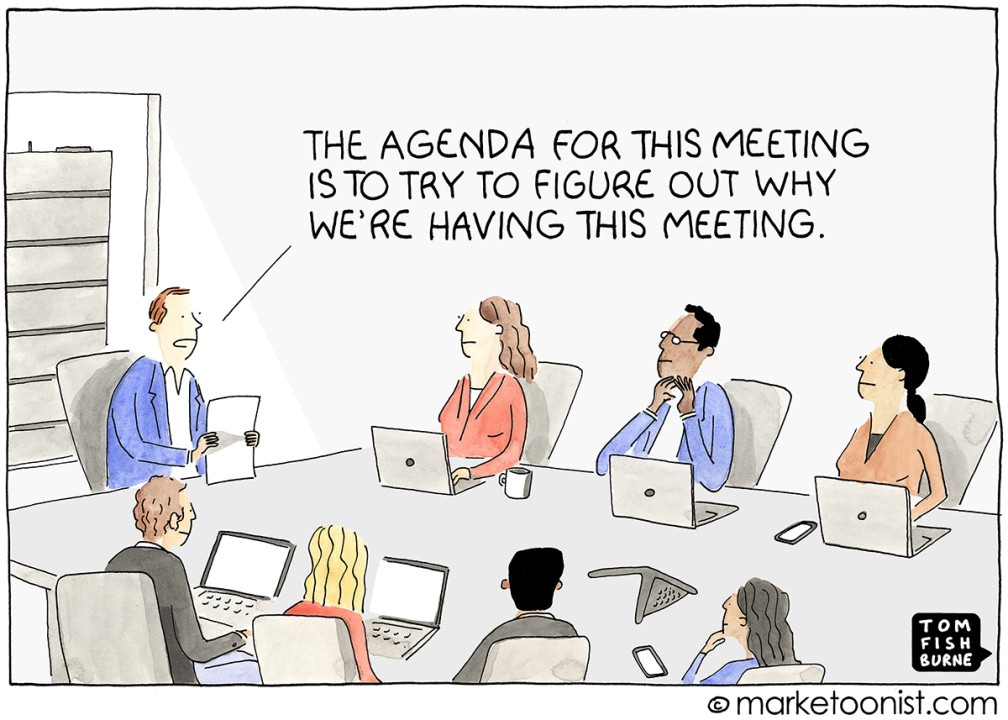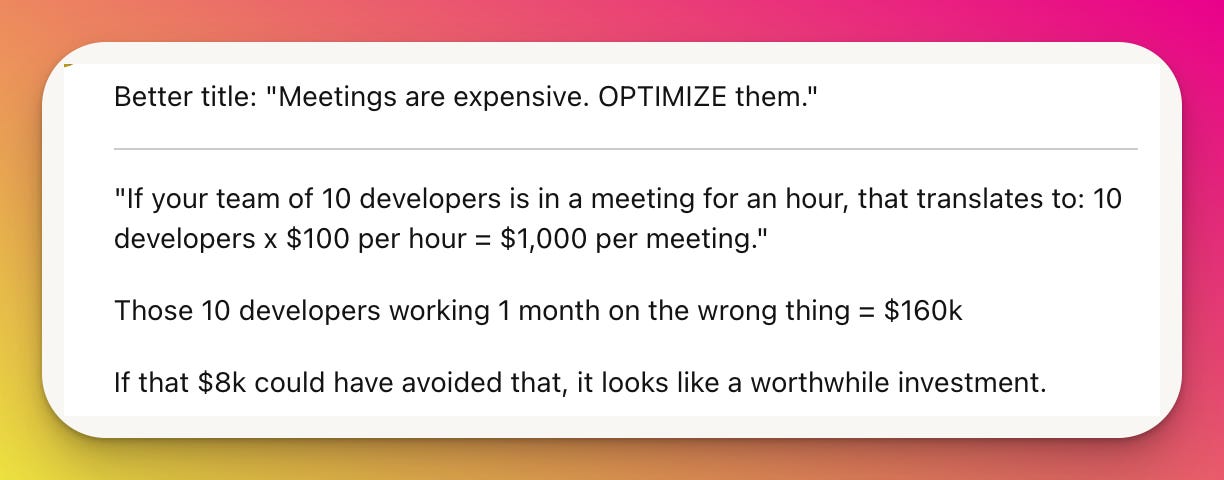TCW #036 | 5 non-jerk ways to say "this meeting is expensive" and escape from meeting madness
When you call meetings out for being expensive, you run the risk of sounding like a jerk. Still want to make the meeting more effective (or even cancel it)? Here are 5 ways that work.
Hey, it’s 📣 Coach Erika! Welcome to a ✨ free edition✨ of The Career Whispers. Each week I tackle reader questions about tech careers: how to get one, how to navigate them, and how to grow and thrive in your role.
Subscribe to The Career Whispers to access these posts, and every future post.
This week, we’re going to talk about that moment when you’re sitting in a meeting thinking, “do we really need everyone here for this discussion?”
In the post- ”Great Recession” era, cost savings frameworks flooded into the world of tech knowledge workers. This 2016-era Harvard Meeting Cost Calculator illustrates the intent to spread Lean manufacturing thinking into knowledge work.
Silicon Valley caught on, and blogs and Reddit threads ignited with a viral conversation about meeting waste. Math-lovers wrote simple math equations to make it clear just how terribly expensive large, unfocused decision meetings could be.
Other math lovers came to the rescue, defending meeting culture as a way to protect against the massive costs of misalignment and blindly marching in the wrong direction.
The conversation jumped from Reddit into everyday meetings. Someone would interject at an awkward moment in a long, crowded meeting:
“This meeting is really expensive. Can we get to the point?”
At first, this was novel. Fatigued from meeting culture, many in the room silently thought it was cute or funny or biting but brilliant.
But the person leading the meeting wasn’t intending to be wasteful; they simply couldn’t find a more efficient way to get decisions made. So they forced everyone into a conference room for an hour. It’s painful, but it works.
The problem isn’t the meeting itself, or even the person who is brute-forcing the attention of stakeholders. Having too many meetings is a side effect of poor decision-making culture.
And yet, despite the ignition of this conversation, most companies still haven’t cracked the holy grail of meeting efficiency.

The fundamental 3 meeting efficiency questions still remain:
Should we have this meeting right now?
Is this the right format for this decision?
Do we have the right people? Does everyone in this room need to be here? For the whole time?
Improving decision efficiency is a great conversation to have in an organization. These are all valid questions to ask, whether you are a meeting attendee or the organizer.
This post gives you 5 ways to further the conversation about meeting effectiveness without sounding like a jerk.
We can all take small steps to influence more effective decision-making cultures within our organizations (and escape meeting madness).
Let’s dive in.
#1: if your goal is to free up people who aren’t needed
Should we excuse anyone who feels they aren’t needed to make this decision?
This question is great to ask after the meeting organizer shares the explicit goals and intent of the meeting. At this point, folks who don’t think they can contribute meaningfully to the conversation should leave or drop off.
The best thing about this question is that no one gets offended.
the meeting organizer will understand that you are trying to make the conversation more efficient
the people who stay feel justified in staying
the people who leave are grateful that they got the choice to leave without being rude or breaking any unspoken social contracts
As a bonus, this question inherently opts in those who are most interested in the topic, so the meeting discussion should be more engaged and lively.
#2: if your goal is to free up yourself (by delegating to someone else in the meeting)
I really want to help you make this meeting as productive as possible. I’m not sure my presence is required as <another person in marketing> is already attending, and they’re a great representative for our team.
This one is great when there are multiple people from a single department attending. It’s extra great when you are a manager and you want to empower your direct report to “hold the fort” for your function in the meeting. It’s a true win-win-win:
you save yourself time.
the meeting organizer saves face after bringing in the “big guns” when the right (often more junior) person is already in the room.
your colleague or direct report feels respected and empowered.
Credit for this option goes to my friendAmanda Natividadwho writesThe Menu. She is a queen at blending direct and incisive communications with gentleness when needed.
#3: if your goal is to remind people of the tradeoffs and focus on the ROI
Before we start, is it possible for us to quickly evaluate the ROI on the discussion we're about to have?
I like this one for situations where the ROI math is clear, ie:
✅ If we’re spending $50k of decision time to make a $500,000 decision, that’s a great ROI.
❌ If we’re spending $50k of decision time on something whose worst-case outcome is $5k of revenue loss, that’s not a great ROI.
It’s up to the meeting organizer to understand the ROI and the stakes of their meeting, and it’s fair to be asked this question by a participant, especially if asked respectfully (if in public) or —better yet — privately, before the meeting even starts.
Credit for this option goes to Gavin Blackmer on Twitter
#4: if your goal is to get the discussion back on track
We all want to maximize the value of everyone’s time here, so let’s keep things focused by <insert your suggestion for focus>
We’ve all been there when Peggy and Liam are having a detailed technical discussion in front of 10 other people who don’t need to be involved. Ideally, the meeting owner will step up to the plate and ask to take the discussion offline (and track down the outcome to share back with those who need to be aware).
If that doesn’t happen, it’s fair game for anyone in the room to re-focus the group, and this is a respectful and effective way to do it.
Credit for this option comes from Sr. PM Ferry Hötzel on Twitter.
#5: if your goal is to cancel an unnecessary meeting
I know we all have other urgent and important work. Let’s give ourselves this time back to focus on more critical efforts.
If you’re not the meeting organizer, this is the spikiest of all the options I am including in the list, and (no surprise), this one comes from a software engineering leader.
As the meeting organizer, this is one way to become an office hero 🦸♀️. I use this one when I’ve already decided to cancel a meeting, and I’m sharing the reason why. Hey, wear the cape when you can, right?
This option works well if you want to cancel a daily standup due to planned low attendance, ie during a holiday week. It also works when you’re ready to cancel a long-standing meeting that is no longer needed or that no longer serves its original purpose.
Credit for this option goes toLeo Alexandruwho writes Tech Leadership Unpluggedfor current and aspiring engineering leaders, as well as Evan Wildstein who is a big fan of the heroism of canceling meetings.
Closing Thoughts
You don’t have to be a lemming and deal with ineffective meeting culture. You can advocate for a more efficient and effective work culture without being a jerk.
You can be a kind, supportive colleague helping to fix the root cause of decision-making problems in your team.
Try one of these options and let me know how it goes.
🎉 That’s a wrap! Subscribe to stay tuned…
When you're ready, there are 3 ways I can help you:
→ First Round Ready Course — An affordable 77-minute course that offers the exact job search and interview prep tools, frameworks, and skills that landed 93% of my clients into their dream roles and tech companies…plus it comes with a Quick Wins interview prep workbook to immediately translate your learning into action.
→ 1:1 Job Search Coaching — I offer packaged bundles with pay-for-performance pricing so you know our incentives are aligned, and we win together when you ace your interviews. I also offer on-demand 1:1 sessions that you can book up to 4 weeks out. Check out my testimonials.
→ Resume Glow Up — I fully transform your resume to tell your career story more powerfully and land you more interviews. The resulting resume is optimized for applicant tracking systems (ATS) and for human readers alike. I will also Fairy Godmother your LinkedIn profile to get you more inbounds and more traction with recruiters and interviewers.













